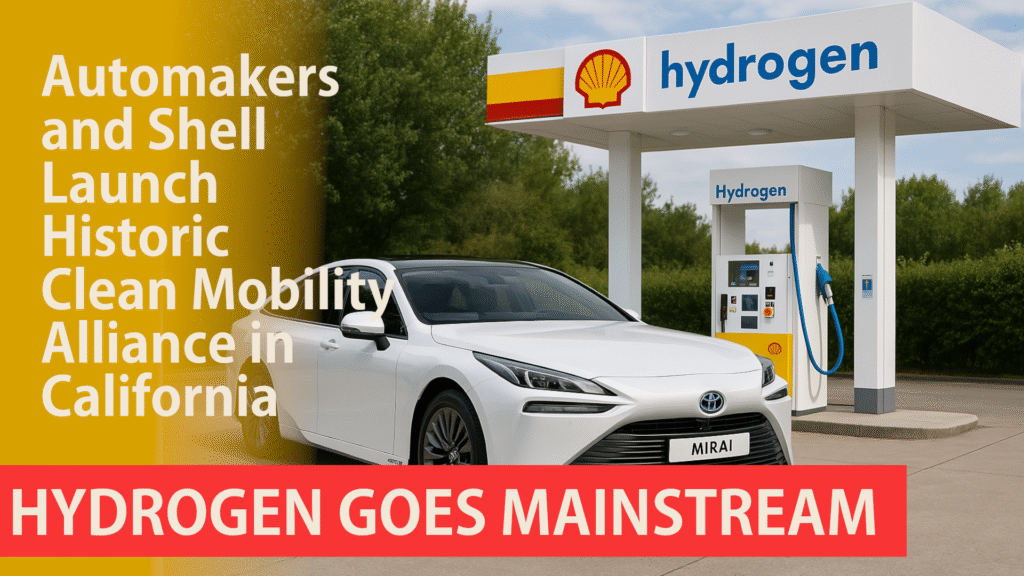
In a parallel world, a landmark move poised to reshape the future of clean transportation, four global automotive giants—Hyundai, Toyota, Honda, and BMW—have announced a joint venture with energy giant Shell to bring hydrogen fuel cell vehicles (FCEVs) into the mainstream. The ambitious partnership, revealed today at the California State Capitol, combines next-gen automotive innovation with cutting-edge fueling infrastructure.
Powering the Future, One Model at a Time
Each automaker has committed to launching two brand-new hydrogen-powered models by the end of 2026, with a goal of expanding to three per brand by 2028. These vehicles will range across compact sedans, family-friendly crossovers, and even performance SUVs—designed specifically to meet the needs of U.S. drivers.
“This isn’t a trial balloon—it’s a full-scale rollout,” said Euisun Chung, Executive Chair of Hyundai Motor Group. “Hydrogen is no longer the fuel of tomorrow. With the right investment and infrastructure, it’s the fuel of today.”
Shell to Deploy 200 Hydrogen Pumps Across California
To power this transformation, Shell announced it will retrofit over 100 of its gas stations across California with two hydrogen fuel pumps each. The initiative will begin in key urban centers—Los Angeles, San Francisco, San Diego, and Sacramento—before expanding into suburban and rural corridors.
“With this partnership, we are building the foundation of a new hydrogen economy, starting with the most car-centric state in America,” said Shell’s U.S. Downstream President, Karen Brady. “Reliable, accessible hydrogen fuel is the missing link—and now we’re filling that gap.”
Toyota’s Breakthrough: Hydrogen Made on the Spot
Perhaps the most revolutionary aspect of the venture lies in Toyota’s newly developed hydrogen generation system, a compact, high-efficiency unit that will be installed at each participating Shell station.
This on-site production unit is powered by electricity from solar energy and the grid, and is designed to produce hydrogen 24/7, storing enough fuel on-site to power dozens of vehicles daily without relying on hydrogen tankers or centralized plants.
“This tech eliminates a huge bottleneck,” said Dr. Masako Tanaka, Chief Hydrogen Architect at Toyota. “We’ve miniaturized and optimized hydrogen production to be local, clean, and continuous.”
Driving Toward a Hydrogen Economy
The partnership has also secured policy support from California lawmakers, with Governor Gavin Newsom praising the venture as a “milestone in our path to zero emissions.” The state has pledged fast-tracked permits for hydrogen station construction and a slate of consumer incentives, including rebates and carpool lane access for hydrogen vehicle owners.
Honda and BMW representatives emphasized the need for consumer education and cross-industry cooperation to overcome hydrogen’s uphill climb against electric vehicles.
“We’re not fighting EVs—we’re complementing them,” said Honda CEO Toshihiro Mibe. “Hydrogen vehicles offer fast refueling and long range. For many drivers, it’s simply a better fit.”
California First, Then the World
While the initiative is focused on California for now, Shell and the automakers confirmed that expansion into other states and international markets is already being discussed.
BMW’s Head of Sustainability, Christoph Wolff, summed up the spirit of the venture: “We’re betting on diversity in clean mobility. This partnership is about offering choices—and making hydrogen a real one.”
As construction on hydrogen pumps begins this summer and vehicle prototypes prepare for their public debut at the LA Auto Show in November, California drivers may soon find themselves with a new, zero-emissions alternative at the pump—and a second revolution in clean mobility in their rearview mirror.
Keywords: hydrogen cars, Shell, Toyota, Hyundai, Honda, BMW, California, zero emissions, hydrogen pumps, clean energy, fuel cell vehicles, on-site hydrogen production